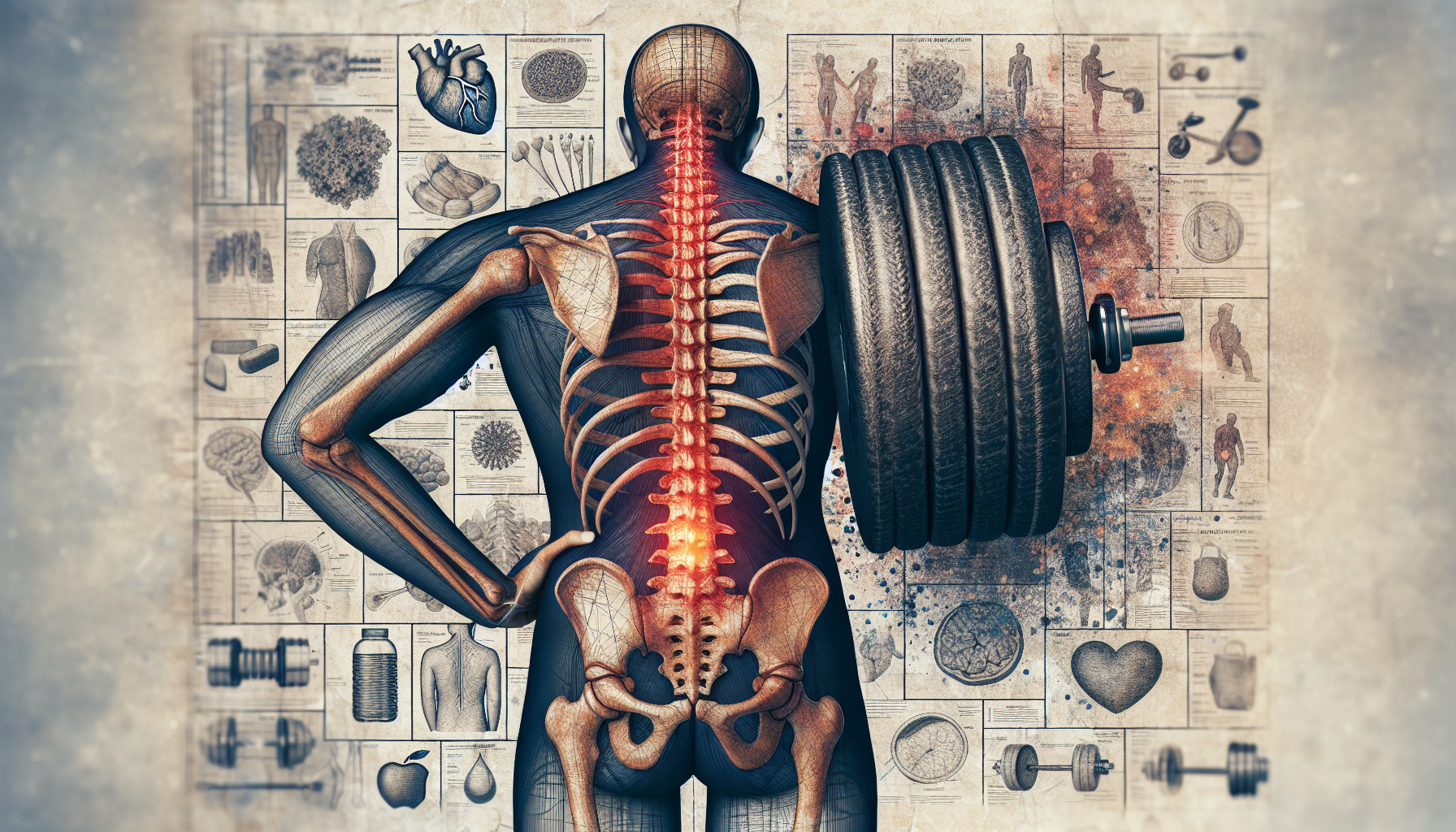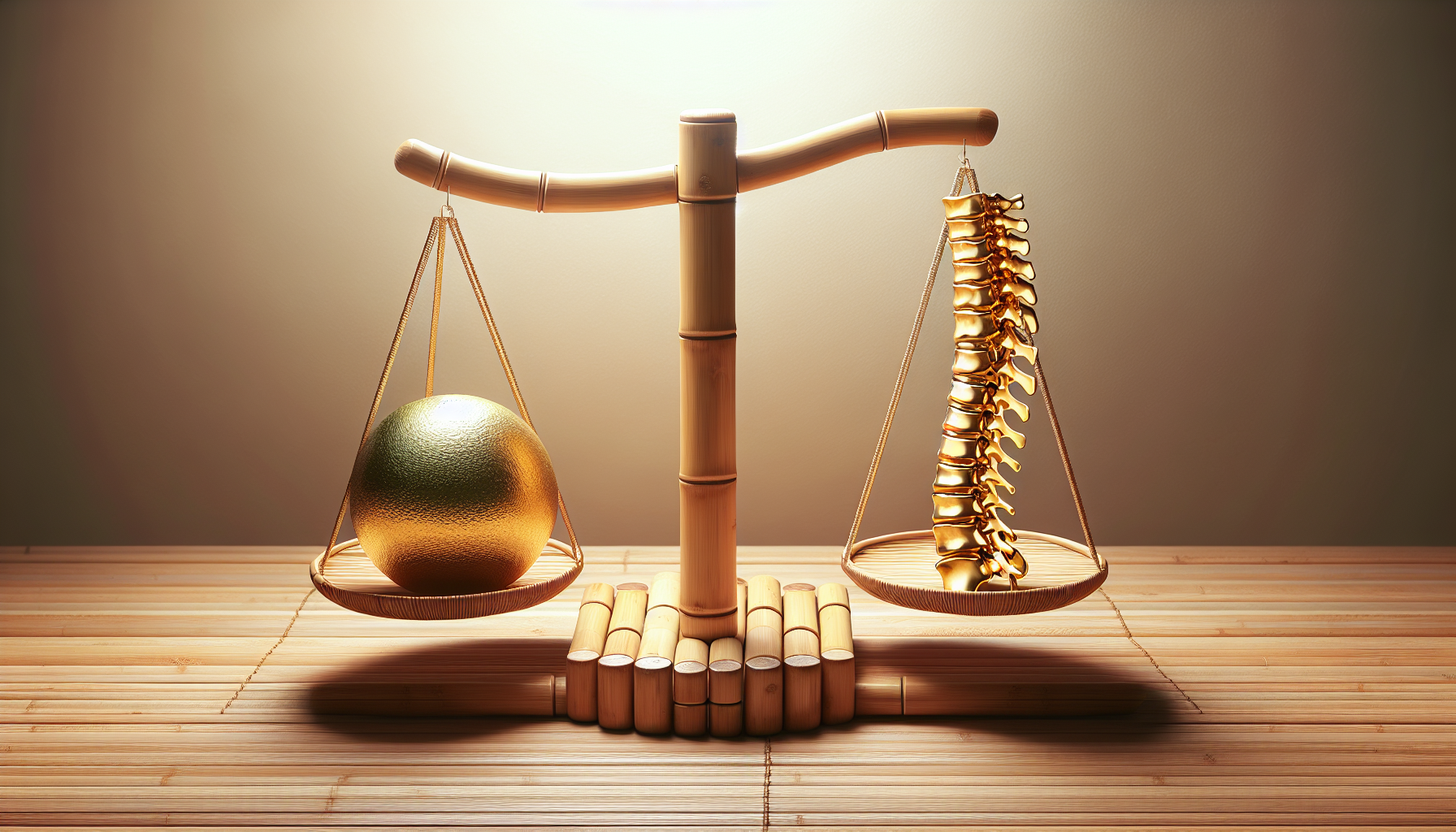Have you ever wondered if being overweight could be linked to chronic back pain? Recent scientific studies have shed light on this very question, revealing potential connections between excess weight and ongoing discomfort in the back. One study published in The Journal of Bone and Joint Surgery found a significant association between obesity and increased incidence of lower back pain. Another study, published in the Annals of Internal Medicine, discovered that individuals with higher body mass indexes (BMIs) were more likely to experience chronic low back pain. These findings suggest that maintaining a healthy weight may play a crucial role in preventing long-term back pain.
Discover the Ultimate Weight Loss Secrets Here!
The Link Between Weight and Back Pain
Back pain is a common ailment that affects millions of people worldwide. Many factors can contribute to the development of back pain, and recent studies suggest that there is a strong link between weight and the occurrence of back pain. Understanding this connection is crucial for individuals looking to manage their back pain and improve their overall health and well-being.
Why is there a connection?
The relationship between weight and back pain can be attributed to several factors. Firstly, excess weight puts additional stress on the spine, leading to increased mechanical strain. Furthermore, excess fat in the body can promote inflammation, which can exacerbate back pain. Changes in spinal alignment due to weight gain can also contribute to the development and severity of back pain.
Recent studies on the relationship between weight and back pain
Numerous scientific studies have been conducted to examine the relationship between weight and back pain. These studies provide valuable insights into the mechanisms behind this connection and emphasize the importance of weight management in preventing and managing back pain.
The impact of excess weight on the spine
Excess weight has a significant impact on the spine. Increased mechanical stress due to the extra weight can lead to spinal degeneration and disc herniation. The spine’s ability to support the body’s weight is compromised, increasing the risk of injury and chronic pain.
Mechanisms of Back Pain in Overweight Individuals
Understanding the mechanisms of back pain in overweight individuals is essential for effective management and prevention. Several key factors contribute to the development and progression of back pain in those who are overweight.
Increased mechanical stress on the spine
Excess weight places added stress on the spine, particularly the discs and joints. The increased load can result in wear and tear, making the spine more susceptible to injury and pain. Over time, this can lead to chronic back pain.
Excess fat and inflammation
Excess fat tissue releases pro-inflammatory cytokines that can promote inflammation throughout the body, including the spine. Inflammation can contribute to the pain response and increase the severity of back pain.
Changes in spinal alignment
Weight gain can alter the natural alignment of the spine, placing additional stress on certain structures. This misalignment can lead to muscle imbalances, postural abnormalities, and increased strain on the spine. Over time, these changes can contribute to chronic back pain.
Click Here for Proven Fat-Burning Strategies!
Evidence from Scientific Studies
To support the link between weight and back pain, several scientific studies have been conducted that provide valuable insights into this relationship. These studies help establish a strong basis for understanding and addressing weight-related back pain.
The Role of Obesity in Low Back Pain
A study published in the Journal of Spine examined the association between obesity and low back pain. The researchers found a significant correlation between obesity and the prevalence of low back pain. The study concluded that reducing excess weight could alleviate low back pain symptoms.
Obesity and its Impact on Lumbar Disc Degeneration
In a study published in the Journal of Orthopedic Research, researchers investigated the impact of obesity on lumbar disc degeneration. The study revealed that individuals who were overweight or obese had a higher risk of developing lumbar disc degeneration, a common cause of back pain.
Obesity and the Risk of Developing Chronic Back Pain
Another study published in the European Spine Journal focused on the relationship between obesity and chronic back pain. The researchers found that obese individuals were at a significantly higher risk of developing chronic back pain compared to individuals with a healthy weight. The study suggested that weight reduction could help prevent the onset of chronic back pain.
Weight Loss as a Solution
Weight loss plays a crucial role in alleviating back pain for individuals who are overweight or obese. By shedding excess pounds, individuals can reduce the stress on their spine and improve their overall back health. Several strategies can aid in weight loss and back pain management.
The role of weight loss in alleviating back pain
Weight loss can reduce the mechanical stress placed on the spine, relieving pressure on the discs, joints, and other supporting structures. As a result, back pain may decrease in intensity and frequency.
The benefits of exercise and physical therapy
Regular exercise and physical therapy are effective tools for weight loss and back pain management. These activities can strengthen the core muscles, improve posture, and promote flexibility, all of which are crucial for alleviating and preventing back pain.
Dietary modifications for weight management
Adopting a healthy and balanced diet is essential for weight management and back pain relief. Incorporating nutrient-rich foods, limiting processed foods and sugary drinks, and practicing portion control can contribute to sustainable weight loss and reduce the risk of back pain.
Unlock Your Path to a Healthier You!
Preventive Measures and Lifestyle Changes
Preventing back pain and maintaining a healthy weight go hand in hand. Implementing preventive measures and making positive lifestyle changes can reduce the risk of developing back pain and support overall well-being.
Maintaining a healthy weight to prevent back pain
Maintaining a healthy weight can significantly reduce the risk of developing back pain. By adopting a well-balanced diet and engaging in regular physical activity, individuals can manage their weight effectively and protect their spine from unnecessary strain.
The importance of posture and ergonomics
Maintaining good posture and practicing ergonomic principles are crucial for preventing back pain. Proper alignment while sitting, standing, and lifting heavy objects can reduce the strain on the spine and promote back health.
Regular physical activity for back health
Regular physical activity is essential for maintaining a healthy weight and preventing back pain. Engaging in activities such as walking, swimming, or yoga can strengthen the muscles that support the spine, improve flexibility, and reduce the risk of injury.
Seeking Professional Help
When dealing with chronic back pain, it is essential to consult with a healthcare professional for an accurate diagnosis and appropriate treatment options. A healthcare provider can offer personalized guidance based on the individual’s specific condition and help manage chronic back pain effectively.
Consulting a healthcare professional for back pain diagnosis
A healthcare professional, such as a primary care physician or a spine specialist, can thoroughly evaluate the underlying causes of back pain. Through a comprehensive assessment, they can determine whether weight is a contributing factor and recommend appropriate treatment.
Treatment options for chronic back pain
Various treatment options are available for chronic back pain, ranging from conservative approaches to more interventional therapies. These may include physiotherapy, chiropractic care, medications, injections, or, in some cases, surgical interventions. Healthcare professionals can devise an individualized treatment plan based on the severity and underlying causes of the back pain.
Support and resources for individuals with back pain
Living with chronic back pain can be challenging, but several support groups and resources are available to provide guidance and encouragement. Online communities, educational websites, and local support groups offer valuable information, sharing experiences, and emotional support for individuals coping with back pain.
Psychological Factors and Back Pain
Psychological factors, such as stress and mental well-being, can significantly impact back pain. Addressing these factors alongside physical interventions is crucial for comprehensive back pain management.
The impact of stress and mental well-being on back pain
Stress and poor mental well-being can exacerbate back pain symptoms. Psychological distress can lead to muscle tension, altered pain perception, and increased sensitivity to pain. Managing stress levels and promoting mental well-being can positively influence back pain.
The role of behavioral therapy and stress reduction techniques
Behavioral therapy techniques, such as cognitive-behavioral therapy (CBT), can help individuals manage stress and mental health issues related to back pain. CBT focuses on identifying and modifying negative thought patterns and developing effective coping mechanisms to reduce the impact of psychological factors on back pain.
Addressing psychological triggers of back pain
Identifying and addressing psychological triggers of back pain is essential for effective management. This may involve relaxation techniques, mindfulness practices, stress reduction strategies, and seeking appropriate psychological support when needed.
Back Pain Management Techniques
To manage back pain effectively, various techniques and therapies can be employed. Understanding and exploring these options can help individuals find relief and improve their quality of life.
Modalities for pain relief
Modalities such as heat therapy, cold therapy, and transcutaneous electrical nerve stimulation (TENS) can provide temporary pain relief. These non-invasive techniques can help reduce inflammation, improve blood circulation, and alleviate back pain symptoms.
Medications and their effectiveness
Medications, such as non-steroidal anti-inflammatory drugs (NSAIDs) or muscle relaxants, may offer short-term relief for acute back pain. However, it is crucial to use these medications under the guidance of a healthcare professional and be aware of potential side effects.
Alternative therapies for managing chronic back pain
Alternative therapies like acupuncture, chiropractic care, massage therapy, and yoga have shown promise in managing chronic back pain. These therapies aim to address imbalances, promote relaxation, and enhance the body’s natural healing mechanisms.

The Importance of Maintaining a Healthy Weight
Maintaining a healthy weight is crucial for overall health and well-being. Beyond preventing back pain, weight management offers a range of benefits that can positively impact an individual’s life.
Preventing other weight-related health complications
Maintaining a healthy weight not only reduces the risk of back pain but also helps prevent other weight-related health complications. These may include cardiovascular disease, diabetes, joint problems, and certain types of cancer.
Overall benefits of weight management
Weight management has numerous benefits, including increased energy levels, improved mobility, enhanced mental well-being, and reduced risk of chronic diseases. Maintaining a healthy weight supports a higher quality of life and overall longevity.
Creating sustainable lifestyle changes
Adopting healthy lifestyle habits is key to achieving and maintaining a healthy weight. By incorporating small, sustainable changes into daily routines, individuals can establish lifelong habits that support weight management and overall well-being.
Conclusion
The link between weight and back pain is evident, with numerous studies highlighting the impact of excess weight on the spine. Understanding this relationship is crucial for individuals looking to alleviate and prevent back pain. By taking proactive steps towards weight management, seeking appropriate medical guidance, addressing psychological factors, and exploring various back pain management techniques, individuals can greatly improve their overall health and well-being. It is essential to prioritize a healthy weight and engage in a comprehensive approach to back pain management for long-term relief and a healthier lifestyle.

